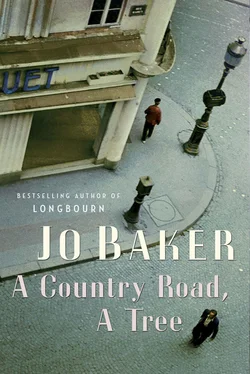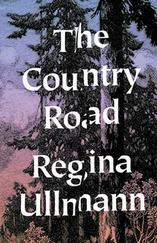There is a strange push-pull to this, an urgency and a dread. He grabs the handrail, heaves himself up three steps at a time, striding his way up the spiralling helix. He can’t let himself think too much about the doing of it; it must just be done.
Suzanne halts two steps above him. She is fastening her glove. They are caught out by the suddenness of the encounter, their eyes locked. She is struck, again, by the brightness of the blue; he is caught by the warmth of her eyes, black-coffee-brown. Her gaze slides away, and she glances over his furrowed forehead, his furze of hair, his cold hand curled round the strap of his bag. She feels an instinctive tug towards him, but there is too much, just too much heaped up now between them. She can’t go over, she can’t go round, she can’t just blunder through.
“It’s you,” she says, and her voice sounds dry and strange.
“Yes, it’s me.”
She is rendered conscious of her stockings — her best pair, though darned at heel and toe. Her patchy pumiced legs. He has seen her worse. But he doesn’t see her now; she knows it. He is here, but she can tell that he isn’t really here at all.
“Well,” she says, and she doesn’t know what else to say.
He steps up and kisses her on the cheek. The smell of her, of old coat and body and a faint whiff of perfume, which she must have been eking out so carefully. If they could get back to where they left off, to that stupid lovely summer five years ago, when her body was sepia-printed from the sun and they had been easy together; if they could drag themselves back to that, claw their way along through mud and dust. But there is so much territory, so much cooling space between them. There is so much wear and tear.
No point pinning it with words, he thinks. Let it flutter by.
“You’re back,” she says.
He nods.
“And that’s that, is it?”
He says, “That’s that.”
There is maybe more that he could say, phrases he could conjure up and offer out to her that would help, but his eyes drift past her on and up the stairs, into the shadows.
“Good,” she says. “Well. I missed you.”
Then she just slips past him and goes on, clipping down and round the stair, going briskly. He watches. She turns again and she is gone. Her footfalls fade out, and the porte cochère opens and then slams behind her.
She pauses in the street. She touches her eyes with a gloved finger. There is time, she tells herself; they have been granted that, at least. But is more time really what they need?
The circling stairs twist up into the shadows. His chest aches; his scar hurts. Perhaps he should go after her. He hefts the bag strap up his shoulder and begins again to climb.
Inside, he drops his bag and locks the door behind him. The apartment is cold and dim. He unbuttons his greatcoat but keeps it on. He moves around the room, touching things into place, going into the kitchenette to set water to boil. He hunkers down by his bag to rummage out his notebook, a new bottle of ink, his fountain pen. The pan begins to rattle as he lays his materials out on the tabletop. He goes to make coffee, brings the things back through. He draws out the chair and sits. In silence and in solitude, he folds open his new notebook. He flattens out the page. He dips his pen into the ink, and fills it, and wipes the nib. The pen traces its way across the paper. Ink blues the page. Words form. This is where it begins.
I first read Beckett during my MA in Irish Writing, at the Queen’s University of Belfast. I was at once unsettled and fascinated — those battered, persecuted characters, scraping by in the margins of a hostile world. This was like nothing else I’d ever read. Beckett’s work seemed to float free — I had no reference points; I felt lost.
Until my tutor, Dr. Eamonn Hughes, pointed out that Beckett had been stuck in occupied France during World War Two; he’d had to go into hiding. It was a light-bulb moment: a modern eco-bulb; a slow-growing light. I began to get an inkling of where these characters came from, the nature of the world they inhabited. The context of Beckett’s wartime experiences was not, by any means, the way to understand Beckett’s complex and allusive work, but it was a light by which to peer at bits of it.
Because the war years did mark a major change in Beckett’s work: he was already a published writer when the conflict broke out, but the work sometimes feels like that of an (albeit brilliant) adolescent, overburdened by his influences. There are indicators of change beforehand, but those years in occupied France seem to have established many of the key themes, images and preoccupations of Beckett’s later work. They also marked the start of his paring away at language: a stripping-back of Joycean wordplay and polyphonic extravagance, towards bare bones, and silence. Beckett experienced, in the direct aftermath of war, an epiphany. He understood, fully and for the first time, the kind of writer he would be. This revelation occurred not when confronted by the wild darkness of a storm-torn sea — as Krapp’s Last Tape might seem to suggest — but with appropriate-for-Beckett bathos, at his mother’s suburban bungalow in Foxrock.
The war was not something that Beckett just drifted through; it presented him with a series of extraordinary moral choices. And in impossibly difficult situations, he consistently turned towards what was most decent and compassionate and courageous. He chose to face the war with his friends in France, rather than sit it out in neutral Eire. He chose to give his subsistence-level rations away to those in still greater need. He chose to resist. He chose to survive. And then, after the devastation, he chose to aid with the rebuilding.
In short, he grew, as a writer and as a man. Afterwards he would go on to write the work that would make him internationally famous, and for which he would be awarded the Nobel Prize for Literature. Work that still resonates powerfully with us today.
A Country Road, A Tree emerges from a profound sense of admiration for both the writing and the man; it is an attempt to offer up a fictional version of this story, because it casts a particular light on both. But there is also a personal connection here. Beckett and I had a mutual friend. Barbara Bray was a literary translator and a drama producer. She was a great supporter of my husband’s and mine when we were starting out as writers. I’m so grateful for her kindness, for the warm, supportive correspondence, the lunches and drinks she insisted on treating us to when we were young and broke. I sent her a copy of my first novel when it was published; she sent us a present — a pair of beautiful hand-made pewter coasters for our writing desks — when we got married. I didn’t know, at the time, the extent of her involvement in Beckett’s life. She was not, after all, just a friend to him, but she was a good and valued friend to us.
I am also grateful to James Knowlson for his magisterial biography Damned to Fame: The Life of Samuel Beckett (Grove Atlantic, 1996): spending time immersed in this extraordinary book has been one of the chief pleasures of working on A Country Road, A Tree. The other biographies, Deirdre Bair’s Samuel Beckett: A Biography (Harcourt Brace Jovanovich, 1978) and Anthony Cronin’s Samuel Beckett: The Last Modernist (Harper, 1997), each offered their own invaluable perspective on this phase in Beckett’s life. Whilst there is little in the way of wartime correspondence, the Cambridge University Press edition of The Letters of Samuel Beckett, edited by George Craig, Martha Dow Fehsenfeld and Lois More Overbeck, provided key way-markers and essential detail throughout the writing process. I also found myself turning again and again to Phyllis Gaffney’s Healing Amid the Ruins: The Irish Hospital at Saint-Lô (1945–46) (Dublin: A. & A. Farmar, 1999) for its fascinating account of the Irish Red Cross in post-war Normandy.
Читать дальше










